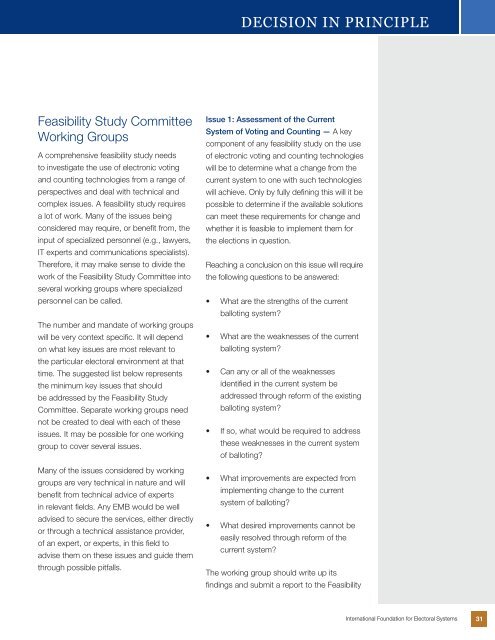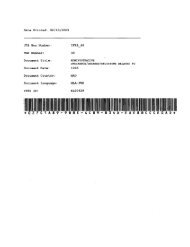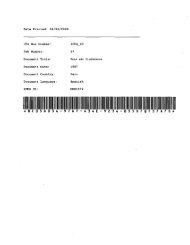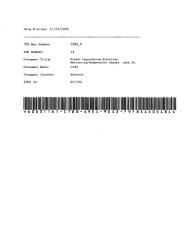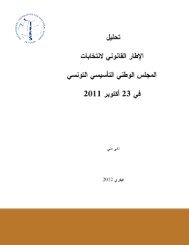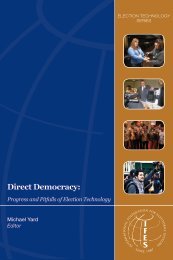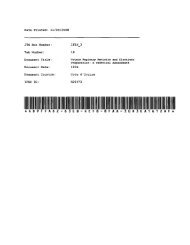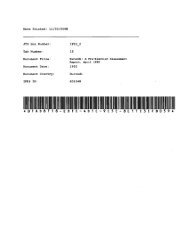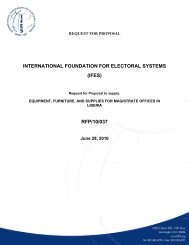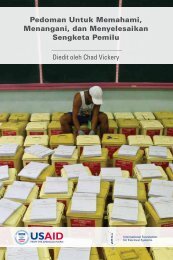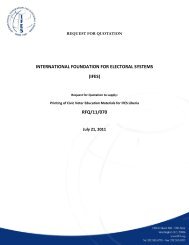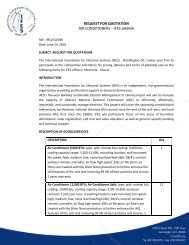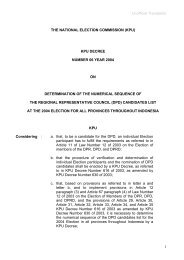Electronic Voting & Counting Technologies - IFES
Electronic Voting & Counting Technologies - IFES
Electronic Voting & Counting Technologies - IFES
- No tags were found...
Create successful ePaper yourself
Turn your PDF publications into a flip-book with our unique Google optimized e-Paper software.
INTERNATIONAL ELECTORAL DECISION IN STANDARDSPRINCIPLEFeasibility Study CommitteeWorking GroupsA comprehensive feasibility study needsto investigate the use of electronic votingand counting technologies from a range ofperspectives and deal with technical andcomplex issues. A feasibility study requiresa lot of work. Many of the issues beingconsidered may require, or benefit from, theinput of specialized personnel (e.g., lawyers,IT experts and communications specialists).Therefore, it may make sense to divide thework of the Feasibility Study Committee intoseveral working groups where specializedpersonnel can be called.The number and mandate of working groupswill be very context specific. It will dependon what key issues are most relevant tothe particular electoral environment at thattime. The suggested list below representsthe minimum key issues that shouldbe addressed by the Feasibility StudyCommittee. Separate working groups neednot be created to deal with each of theseissues. It may be possible for one workinggroup to cover several issues.Many of the issues considered by workinggroups are very technical in nature and willbenefit from technical advice of expertsin relevant fields. Any EMB would be welladvised to secure the services, either directlyor through a technical assistance provider,of an expert, or experts, in this field toadvise them on these issues and guide themthrough possible pitfalls.Issue 1: Assessment of the CurrentSystem of <strong>Voting</strong> and <strong>Counting</strong> — A keycomponent of any feasibility study on the useof electronic voting and counting technologieswill be to determine what a change from thecurrent system to one with such technologieswill achieve. Only by fully defining this will it bepossible to determine if the available solutionscan meet these requirements for change andwhether it is feasible to implement them forthe elections in question.Reaching a conclusion on this issue will requirethe following questions to be answered:• What are the strengths of the currentballoting system?• What are the weaknesses of the currentballoting system?• Can any or all of the weaknessesidentified in the current system beaddressed through reform of the existingballoting system?• If so, what would be required to addressthese weaknesses in the current systemof balloting?• What improvements are expected fromimplementing change to the currentsystem of balloting?• What desired improvements cannot beeasily resolved through reform of thecurrent system?The working group should write up itsfindings and submit a report to the FeasibilityInternational Foundation for Electoral Systems 31


